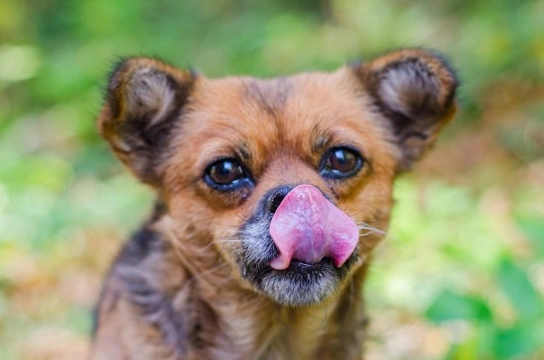
Why might your dog be drooling or licking their lips a lot?
Dogs lick their lips for a whole range of reasons, and often, they are much the same ones behind why we as people might do the same, such as due to a dry mouth, something stuck in their teeth, or because they are tasting something they have eaten! However, if your dog appears to be constantly licking their lips, drooling a lot and developing something of a compulsion to lick around their own mouths and act as if they have something bothering them or stuck in their gums, this may be worthy of further investigation, particularly if your dog appears preoccupied or is also showing signs of discomfort.
If this is something that has come to your attention recently, or you are concerned that it may mean something is amiss, it is important to find out if anything is wrong, and to assess what is happening. In this article, we will look at some of the most common reasons behind why your dog may be licking their lips or drooling a lot, and what to do about them.
Normal reasons for lip licking and drooling
Some breeds and types of dogs are simply more apt to drool than others, and if this is the norm for your dog’s breed, then don’t worry! Your dog is likely to lick their lips if they are about to get fed or are hoping to earn a treat, and lip licking can also be used as a signal of appeasement and calming when interacting with others.
However, if you have assessed that none of these things are the case, check out some of the possible other reasons for lip licking, which may indicate a problem.
Feeling nauseous
If your dog has an upset stomach or is feeling a little sicky, whether they have vomited or not, they may be sitting with their mouth slightly open, drooling a lot, or repeatedly licking their lips.
If their stomach is unsettled or rebelling, this produces excessive saliva, and so drooling and lip licking are normal indicators of this. Your dog may ultimately vomit and then the incident will pass, or their stomach may settle on its own, and this too will stop the licking and drooling. Providing that this does not happen regularly, it should not be cause for major concern.
Canine bloat
Bloat is a serious canine condition that is fast in its onset, and should be treated as a veterinary emergency.
The symptoms of canine bloat are varied, and almost always involve excessive drooling and lip licking, also accompanied by attempting to vomit without success, pacing around uncomfortably, and unproductive retching. Bloat can become life-threatening very quickly, so if your dog is displaying all of these symptoms in combination, get them checked out by your vet asap.
Dental pain or problems
One of the most obvious causes of drooling and lip licking is the possibility that there is something wrong with your dog’s teeth or gums, or with the mouth in general. Extreme dental decay, broken or rotting teeth and painful gums can all bother your dog an awful lot, so if your dog’s teeth are not in good condition, this is something that you should look to address by means of a veterinary dental procedure. If your dog has something stuck in their teeth or lodged in the gums or soft palate, this too can cause drooling and lip licking, even if your dog’s teeth are in good condition.
Various other conditions such as mouth ulcers, boils and growths within the mouth can also lead to drooling and pain, so check your dog’s mouth out to see if you can spot anything obvious. Even if there is nothing that you can see, it is worth getting your vet to have a proper look, in case they can spot something that you have missed.
A foreign body lodged in the respiratory system
Dogs can be apt to inhaling or swallowing small objects such as grass seeds, blades of grass or burrs, which can get stuck within the throat or nose and prove hugely irritating and annoying for your dog. If this has occurred, your dog will likely be drooling, licking their lips and possibly pawing at their nose and mouth, as well as coughing or sneezing to try to dislodge the item in question.
If your dog appears to be preoccupied with something around their muzzle or throat, again, take them to the vet to find out what it is and have it removed.
Focal partial seizures
Focal partial seizures can cause your dog to “zone out” for a few seconds at a time, as they undergo a type of neural storm that can lead to a type of temporary trance state, or potential involuntary twitching movements including snapping, drooling and licking. These types of seizures usually pass within a few seconds, and require a formal diagnosis in order to work out how to proceed.



